|
 |
The
culture of the steelpan stems from its deep African roots.
After the abolition of salvery in 1834, the Africans first
settled Laventille behind the bridge that crosses the Dry
River which ran along its foothills. Because it cost a penny
to cross the bridge, it was virtually closed to the Africans.
Despite poverty's hardships, life teemed in the area along
with many of the African customs which divided along tribal
or religious lines.
|
|
LAVENTILLE
During slavery the Africans on each plantation developed
a sense of oneness brought on by their common plight which
translated itself into friendly rivalry among the various
estates. The planters encouraged many forms of competition,
including the stickfighting sport. The result was that the
emancipated groups became tribe-like, having little social
communication with other areas except to carry on the rivalries
of their former lives. Each district had a tamboo bamboo
band which spurred on each district's champion stickfighters
with its chants and rhythms. The stickfighting tournaments
often degenerated into free-for-alls. The rivalry brought
them into open conflict. |
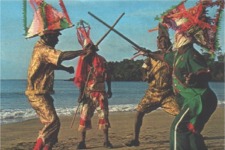
Stick Fighting
|
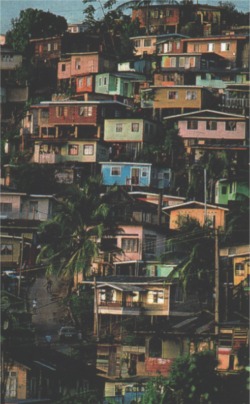
Laventile Hills
|
| Since
the authorities generally ignored the area, and there was
no means of livelihood or economic support, the area degenerated
into slum-like conditions, with a minority developing a
bad reputation. The majority, however, were good, normal,
upright and law-abiding citizens. There were particular
groupings of people who shared the slave voyage on the British
men-of -war who held singing and dancing in high esteem.
They demonstrated their artistic skills at wakes, dances,
and religious ceremonies. |
|
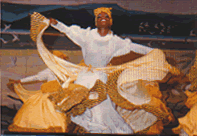
Dancing
the Bele
|
|
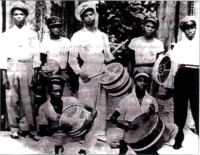
Red
Army Steelband
|
STEELBANDS
As the steelbands emerged, gangs started to attach themselves
to them. In those days every district around Port of Spain
was its own island, and the steelband within its boundaries
was its army, providing warriors to uphold its sovereignty.
American movies and the presence of the American Navy base
in Trinidad provided the means of identification with a
culture that condoned the use of force to settle disputes.
Identifying with movie characters in the westerns, ganster
movies, and war and propaganda films caused many of the
bands to change their names. John John Steelband became
Destination Tokyo. Others became Casablanca, Free French,
Invaders, Red Army, Rising Sun, Five Graves to Cairo, Tripoli,
Boys Town, and Renegades. Hell Yard Tamboo Bamboo band became
Cross of Lorraine, now called All Stars, and Laventille's
Dead End Kids became the Desperadoes. |
|
PANYARDS
The panman in those days was fully aware of his social position
as the dregs of society. History repeated itself from the
outlawing of the beating of skin drums at religious festivals
to the later prohibition of calypso singing and banning
certain aspects of the Carnival celebration. When the economically
and socially deprived underclass was denied their right
of self-expression through their music which gave them a
means of creating their own cultural identity, these youths
deliberately became "bad boys", continuing their
war against the oppressors, and became violent by choice.
Since nothing could be gained by fighting the colonial authorities,
their frustration was turned on each other, and gang wars
became the order of the day with violence occurring among
rival bands and between bands and the police. The authorities
gave violence as their reason for opposing steelband. |
|
|
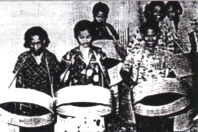
Girl
Pat Steel Orchestra
|
|
No
wonder light-skinned middle class parents were upset when
they couldn't stop their sons from beating pans. They
had fallen in love with pan and became a part of the revolution
without having to bear the full brunt of the struggle.
Their involvement helped to diffuse the violence and in
the process helped to liberate the steeband movement.
It became glamorous and prestigious. Dixieland was the
first middle-class band, followed by Silver Stars, and
in the early 1950's Girl Pat, an all female group of teachers,
civil servants and other white collar workers.
The
most resounding sociological achievement was the steelbands'
racial integration which spread to every ethnic group
in the society.
|
|
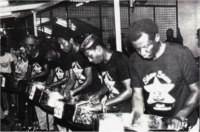
Silver
Stars
|
| Steelbands
entered the bourgeois clubs and middle class home dance
parties. Sponsorship entered the picture with Dixieland
receiving sponsorship from Jeffrey's Beer. In 1956 Pan American
World Airways sponsored the North Stars enabling the band
to make many tours and recordings. Soon other steelbands
attracted wealthy sponsors. The music began to advance as
well with the discipline and dedication of the panmen. By
1962, when Trinidad & Tobago became independent from
165 years of British rule, violence in the steelband had
virtually ceased, as evidenced by more recent steelband
names like Tropical Angel Harps, Merrytones, Birdsong, Rising
Stars, Starlift, and Harmonites. The music began to advance
as well with the discipline and dedication of the panmen
such as Belgrave Bonaparte and his band Southern Symphony
from southern Trinidad who introduced properly arranged
music to steelbands in the 1950's. |
|
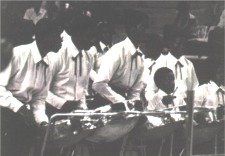
School Steelbands

|
|
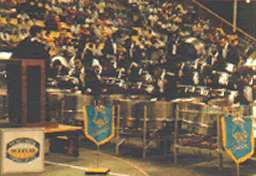
Pat
Bishop with Desperadoes
|
| Brilliant
steelband composers / arrangers emerged such as Len "Boogsie"
Sharpe, Robert Greenidge, Clive Bradley, Leon "Smooth"
Edwards, Jit Samaroo, Pellum Godard, Ray Hollman, Yohan
Popwell and Professor Ken Philmore as well as classical
arrangers / conductors such as Pat Bishop, Anthony Prospect,
Jerry Jemmot and Dawn Batson. |
|
|
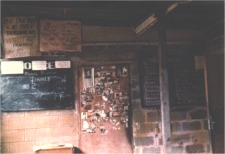
All
Stars' Panyard
|
PANYARDS
In the early days of tamboo bamboo the panyard was known
as the jamette yard where stick-fighting, dice throwing,
card games, and the sale of housewares took place. A shady
tree provided the only decor needed. Today the panyard has
become more of a community show place such as Exodus's Pan
Theatre which also hosts theatrical performances, night
cricket, and the first Pan Ramajay (mini Panorama consisting
of pansides of no more than 10 players). Other examples
are the Desperadoes' Community Center and Renegades' concert
yard. |
|
| Every
village in Trinidad and Tobago has a steelband with its
own panyard which is a world of its own, a community for
pan and a place of love, devotion, and sharing, whether
it's a piece of music, a bite of food, or a dollar. Here
the panman makes contact not only with his friends and other
pan players, but more importantly, he overcomes his fears
and anxieties as he develops the skills and techniques that
allow him to find and arouse the joyous heart of the pan.
"For the pan player who finds himself on the path to
musical excellence, the experience is like spiritual enlightenment." |
|
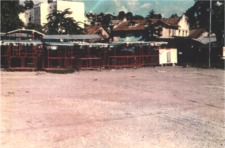
Renegades'
Panyard
|
|
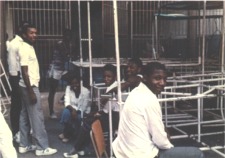
Blue
Diamonds' Panyard
|
|
The
panyard is a place for safe-keeping of the pans, a meeting
place where pan enthusiasts, pan tuners, arrangers, and
music teachers meet for the purpose of planning the strategy
for winning the Panorama
competition championship on the Saturday before Carnival.
Today the bands are disciplined, and their business management
decides how to use the bands' resources. The panyard is
analogous to a football club and provides the common ground
for group solidarity and the binding of its members into
a strong union that makes for greater efficiency in the
realization of shared goals.
|
|
| Besides
pan, the community plays sports and has a center for culture
in the panyard. There you can tap the grassroots
resources of a community. During Carnival season the panyards
are social gathering places for the local community to hear
their band practice for Panorama and support them on the
road to victory. People from all over town, including foreign
tourists, visit the panyards to enjoy the music, pick their
choice to win Panorama, and to party, as there is always
refreshment and a snack. |
|
|
|
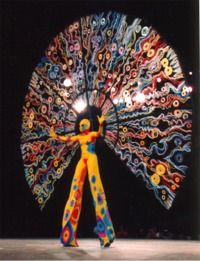
King
of Bands
Peter Mnnishall, Designer
|
CARNIVAL & STEELBAND
The steelband owes its birth and development to Carnival,
and Carnival could not have grown without the steelband.
Carnival means a merry revelry or festival. The word came
from the Latin for "O Flesh, Farewell" and refers
to the merry making season observed in Roman Catholic countries
preceding lent. In ancient times the celebration lasted
from Epiphany (January 6) to midnight of Shrove Tuesday,
the last day before lent. |
|
|
Today,
carnival has been the pride and main tourist attraction
of many countries such as Mardi Gras in New Orleans in
the U.S. (celebrated since 1857) and Carnival in Rio De
Janeiro, Brazil. However, Trinidad's Carnival has been
celebrated since 1784. It owes its origins to the French
planters who settled during Trinidad's Spanish colonization.
Before the end of slavery, Carnival in Trinidad was celebrated
only by the then white upper and middle classes. It enabled
most of the non-African population to adopt fictitious
social roles and to overstep social boundaries. Carnival
started in December with house to house singing and dancing
and built up to the grand Masked Ball, when all restrictions
in social behavior were tossed aside, forgotten, and gave
way to joyful abandon by all with the exception of the
Africans who were strictly forbidden to participate except
to provide entertainment for the upper-class as musicians
or dancers. After emancipation, the Africans completely
took over and joined the festivities with vengeance, depicting
and mimicking the lifestyle and dress of the former masters.
The French Creoles withdrew from the festival because
the whites frowned upon it, deeming it low-class and degenerating.
So by the 1800's Carnival had become a focal point for
the retention of African music, dance, costumes and rituals.
The African drums provided rhythm, which when outlawed,
gave way to tamboo bamboo. When that, also, was outlawed,
the beating of metal objects took over, culminating in
the creation of the steelband.
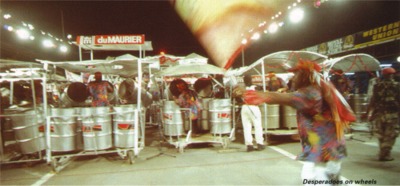
Desperadoes
Now
the Carnival staged event with the largest attendance
and most pre-event "street corner" discussion
is Panorama,
the Super Bowl of Music and heartbeat of Trinidad &
Tobago. Radio and TV announcers give play by play commentary
after each band's performance (the bands being composed
of 100 players) as the judges choose the world's champion
steelband for the year.
|
|
|
STEEL ISLAND
P.O. Box 3223
AUSTIN, TX 78764
800-525-6896 U.S.A. and Canada
Phone / Fax (512) 266-7995
email: pan@steelisland.com
Created
by Viper Sites
All pages copyright Steel Island © 2000. All Rights Reserved
|